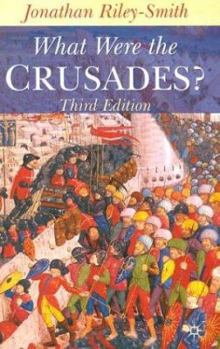What Were the Crusades?
Select Format
Select Condition 
Book Overview
Riley-Smith's acclaimed book is now regarded as a classic short study. The updated fourth edition of this essential introduction features a new Preface which surveys and reviews developments in... This description may be from another edition of this product.
Format:Paperback
Language:English
ISBN:0898709547
ISBN13:9780898709544
Release Date:October 2002
Publisher:Ignatius Press
Length:128 Pages
Weight:0.43 lbs.
Dimensions:0.3" x 5.6" x 8.5"
Customer Reviews
4 ratings
Good academic introduction
Published by Thriftbooks.com User , 18 years ago
I found this book to be a good academic (maybe a bit boring) introduction to the subject of the crusades. It is not a garrish or sensational account of this Christian invasion of the Levant between the 11th and 13th centuries. Instead is an attempt to dispassionately classify the crusades in an academic manner while looking at the factors that instigated and allowed its continuation for 2 centuries.
One scholar's definition of "Crusade"
Published by Thriftbooks.com User , 19 years ago
This slender volume by one of the world's leading scholars of the Crusading period is an excellent introductory on the subject. It has little to do with the various campaigns that made up the Crusades themselves, but rather offers a coherent definition of what a "Crusade" really was. Riley-Smith argues that a "Crusade," to be considered as such, must meet all of the following criteria: 1) it must be an open, voluntary and temporary vow to perform military service in the defense of a Christian place or people; 2) the campaign must receive explicit papal advocacy; 3) the participants must be granted certain privileges generally extended to Christian pilgrims; and, most importantly, 4) participants must receive generous indulgences against sins in return for their service. The author's definition is rather broad by other standards. For instance, he directly rejects the notion that the Crusades focused exclusively on the recapture of the Holy Lands, with a special emphasis on Jerusalem. But he also argues that actions that had an objective of national liberation (as opposed to the liberation of the Republic of Christ) and/or were led by secular monarchs rather than the pope - the Spanish Reconquista is the most obvious example - were not part of the crusading movement, properly defined. Neither were the actions undertaken by the various religious military orders that developed in the Middle Ages, such as the Knights Templar and the Hospitallers, because those groups maintained selective admission standards and their vow was permanent, not temporary. The issue on which Riley-Smith differs most strongly and fundamentally with other leading scholars of the period is his belief that the motivations of the Crusaders were, in the main, pure and sincere. He argues that individual crusaders were driven primarily by self-interest in the offer of plenary indulgence (i.e. the complete remission of guilt and punishment for sins both on earth and in the afterlife) with only a secondary consideration in serving the Republic of Christ; avarice and the lure of plunder in the East played no part. The prospect of eternal salvation and the defense of God's Kingdom on Earth thus propelled the various campaigns that came to be known as the Crusades; they weren't smokescreens for conquest. One final note: "What were the Crusades?" is concise and introductory, but it isn't light. Much of the material is dense and the first-time reader may find that they need to proceed slowly through the chapters to fully absorb the arguments. Also, a good follow up book to this one is the classic overview of the Crusades by the German historian Hans Eberhard Mayer. You'll quickly see the differences in opinion between these two leading scholars.
Brilliant intro
Published by Thriftbooks.com User , 20 years ago
This book IS available in a sharp looking 100 page softcover from Ignatius Press. Its the 3rd edition with new intro since its original publication in 1977. Dr. Riley-Smith, full professor at Cambridge, is THE leading authority on the Crusades. This book is a workout for the non-specialist. Its obstensibly an exercise in definition: Few ever bother to define what exactly is a 'Crusade' and what isn't -- he shows the different schools of thought on this question and renders his own judgment. In the process he gives an historic overview, a highly sophisticated commentary on the crusade ideal (and ways the actual practice fell short), and much more. One of the best succinct definitions of the Christian Just War theory I've ever seen (as well as Holy War theories that have fallen out of favor). If this leaves you wnating more, check out Riley-Smith's masterful The Crusades: A Short History (Yale). Also see the special issue on the Crusades by Christain history magazine form a few years ago (back issues available from Christianity Today Institute online). It is richly illustrated and includes a masterful interview with Riley-Smith among other things for a few dollars.
Useful background and approach
Published by Thriftbooks.com User , 21 years ago
Thanks to Islamism, the subject of the Crusades has gained new currency, indeed urgency. This is the third edition of a very useful introduction to the crusading enterprise by a distinguished professor of history at Cambridge. Who were the Crusaders, what did they believe they were doing, what were the moral legitimations of their cause? These and other questions are addressed, and the book includes a helpful annotated bibliography for the reader who wants to learn more. A first THings review






